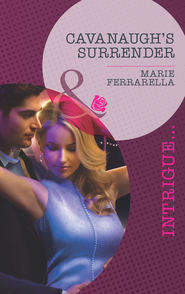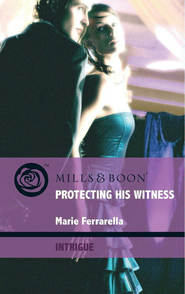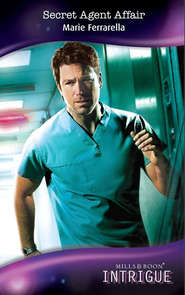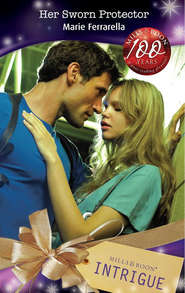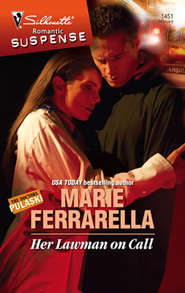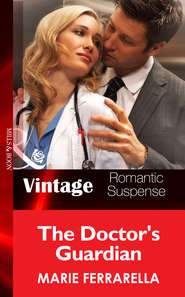По всем вопросам обращайтесь на: info@litportal.ru
(©) 2003-2024.
✖
Lassoed by Fortune
Автор
Год написания книги
2019
Настройки чтения
Размер шрифта
Высота строк
Поля
So when she saw her mother in the store, Julia was more than a little surprised. Her mother was sweeping the aisles, a chore Julia normally took care of just before opening, a full hour before she normally came in. Annie always arrived after having made breakfast for her husband.
Judging by her presence—not to mention the look on her mother’s face—something was definitely up.
Julia approached the problem—because there had to be a problem—slowly by asking, “Mom, what are you doing here?”
Looking far from her normally sunny self, Annie answered, “It’s my store. I work here. Or have you forgotten?”
“I know you work here, Mom,” Julia said patiently, “but you don’t come in until after eight. Everything okay with Dad?” she asked, suddenly concerned.
Julia realized that was the only thing that would make her mother break with her regular routine. Her mother was nothing if not a creature of habit. It was Annie who had taught her that a regular routine would give her life structure.
And she had been right.
If it hadn’t been for her routine, Julia was certain that the act of setting her goals and dreams aside would have crushed her spirit so badly she wouldn’t have been able to function and come through for her parents the way she had. She had taken everything over, becoming what her mother was quick to point out was not just her right hand, but her left one, as well.
Julia owed that to a well-instilled sense of structure, not to mention to a very keen sense of family loyalty.
“Your father,” Annie said, answering her question, “is the same as he was yesterday and, God willing, the same as he will be tomorrow. Well, but not perfect.” She paused to smile at her daughter. “But then, no man is ever perfect.”
It was a familiar mantra that her mother had uttered more than a handful of times.
What was different this time was the sadness around the edges of her smile. And the deeper sadness she could see in her mother’s eyes.
Taking the straw broom out of her mother’s hands, Julia leaned it against the closest wall. She then took both of her mother’s hands in hers and said, “Mom, if your face was hanging down any lower, you wouldn’t need that broom to sweep up all that imaginary dust you always see on the floor. You could use your chin. Now come clean. What’s wrong?”
Annie took a breath, apparently struggling to find the right words.
“It’s you.”
Julia stared at her mother. Whatever she’d expected to hear, it wasn’t that.
“Me?” she cried incredulously.
Her mother’s answer had succeeded in stunning her. How could she possibly be responsible for that look of utter devastation on her mother’s remarkably unlined face? Hadn’t she all but lived and breathed family and the business for twelve years now, leaving aside her own hopes and dreams?
In her view, that would have been cause for her mother to celebrate, not look as if someone precious to her had just died.
“Mom, how can you say that? What more can I do? I’m almost knocking myself out every day to make sure the store stays open and running,” Julia pointed out.
Her mother shook her head, her expression telling her that she just didn’t understand. “That’s just it, Julia. You shouldn’t have to be knocking yourself out. This is the time of your life that you should look back on fondly when you get to be my age. You shouldn’t be forced to feel like you worked your life away.”
“But I don’t feel that way, Mom,” Julia protested with feeling. Granted, there were times when she felt as if she did nothing but work, but for the most part, she did fine running the grocery store—not to mention putting out her baked goods in a little area that was set aside for the shopper who required a cup of coffee and a pastry to jump-start their morning.
Rather than look relieved, her mother looked as if she was growing agitated for her.
“Well, if you don’t, you should,” her mother insisted. “You should be resentful that your father and I stole twelve perfectly good years of your life away from you by allowing you to be here for us.”
Still holding her mother’s hands, Julia led her to a chair over in the corner, just behind the main counter, and knelt in front of her, looking directly into her mother’s kind, warm eyes.
“Mom, what’s this all about?” she asked gently.
“Maybe I’m seeing things clearly for the first time in years. This isn’t fair to you, honey,” she insisted, “making you work here day after day. You’ve sacrificed your education, your career, your marriage—”
“Hold it,” Julia declared, holding up her hand. “Back it up, Mom. First of all, I didn’t sacrifice my education. I can always go back to college. It would take a little doing, but it’s not impossible. Second, I do that. I can get a career going. And besides, the one I had my eye on back then didn’t ultimately require having a college degree so much as it required dedication—it still does,” she said, unlocking the front door, then walking back to her mother.
“And third, working here was not what killed my marriage. Mutual, soul-snuffing boredom did that.” Julia sighed, feeling a wave of sadness taking root. She had never failed at anything before, but it was about time she accepted the fact that she’d failed at marriage. “Neal and I should have never gotten married in the first place.”
“But Neal was such a nice boy,” Annie pointed out, protesting the whole idea that their marriage had been a mistake from the beginning.
“Yes, he was and he still is,” Julia readily agreed. “But we got married because it seemed like the right thing to do and nobody should get married thinking pragmatically like that. When Neal and I were married, there was no magic, no chemistry, no starbursts—and those are three very important qualities to have in the foundation of a marriage,” Julia stressed.
Leaning in, Julia affectionately pressed a kiss to her mother’s forehead. “So stop beating yourself up. I’m exactly where I’m supposed to be and when the time is right, I’ll go on to another phase of my life. Until then,” she said, rising to her feet again, “why don’t you make sure all the eggs are out of the refrigerator in the storage room?”
The bell that hung over the entrance to the grocery store rang, signaling the arrival of the store’s first customer of the day.
“You do that,” she told her mother, “while I go see what this customer wants.”
Turning from her mother, Julia found herself looking straight up at Liam Jones. She wasn’t a short woman—five foot eight in her bare feet and her feet weren’t bare—but at six foot three Liam literally seemed to tower over her. Especially, she noted, since he was wearing boots that added another inch and a half to his height.
Seeing him here surprised her—when was the last time he’d come to the grocery store?—but Julia managed to recover quickly enough.
“Wow, twice in one week,” she joked, referring to seeing him. “Are the planets about to collide or something equally as dire?”
Liam was frowning. She was beginning to think that his face had set that way, like some grumpy old man who whiled away his days parked in a chair on a front porch, scowling at the world.
“I don’t know about the planets, but we sure are,” he told her darkly.
“And exactly what is that supposed to mean?” Julia wanted to know.
“I came to hear you say that it’s not true.”
“Okay,” Julia said obligingly. “‘It’s not true.’” She waited for him to say something. When he didn’t, she gave in and asked, “What’s not true?”
“The rumors I heard.”
They were back to this again, she thought, frustrated. “Okay, I’ll bite. What rumors?” she asked, gritting her teeth.
What was it about this pompous cowboy that set her so completely on edge every time they were within ten feet of each other?
She couldn’t answer that, which only made the whole situation that much more frustrating for her.
“The rumors that say you’re trying to convince those damn Fortunes to stick their noses where they don’t belong and open up some high-falutin’ restaurant in Horseback Hollow.”
Now how did he know she’d been talking to the Mendozas?
“‘Damn Fortunes’?” she echoed. “Correct me if I’m wrong, but aren’t you a Fortune?” she challenged.
His sharp, penetrating blue eyes narrowed as he said, “Consider yourself corrected.”






